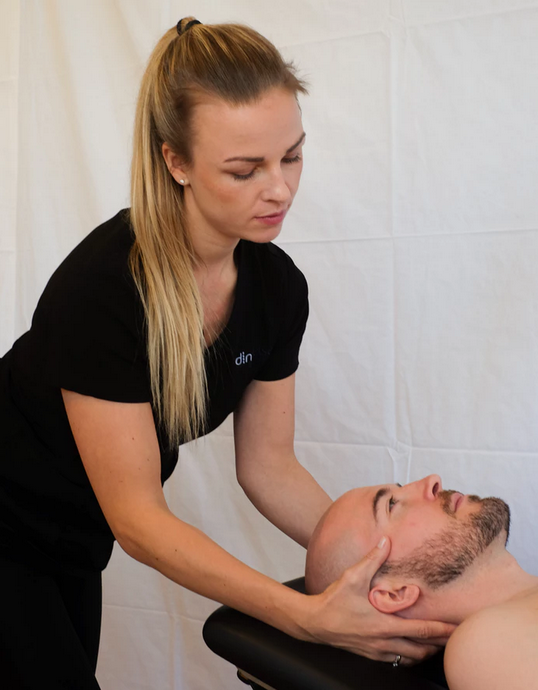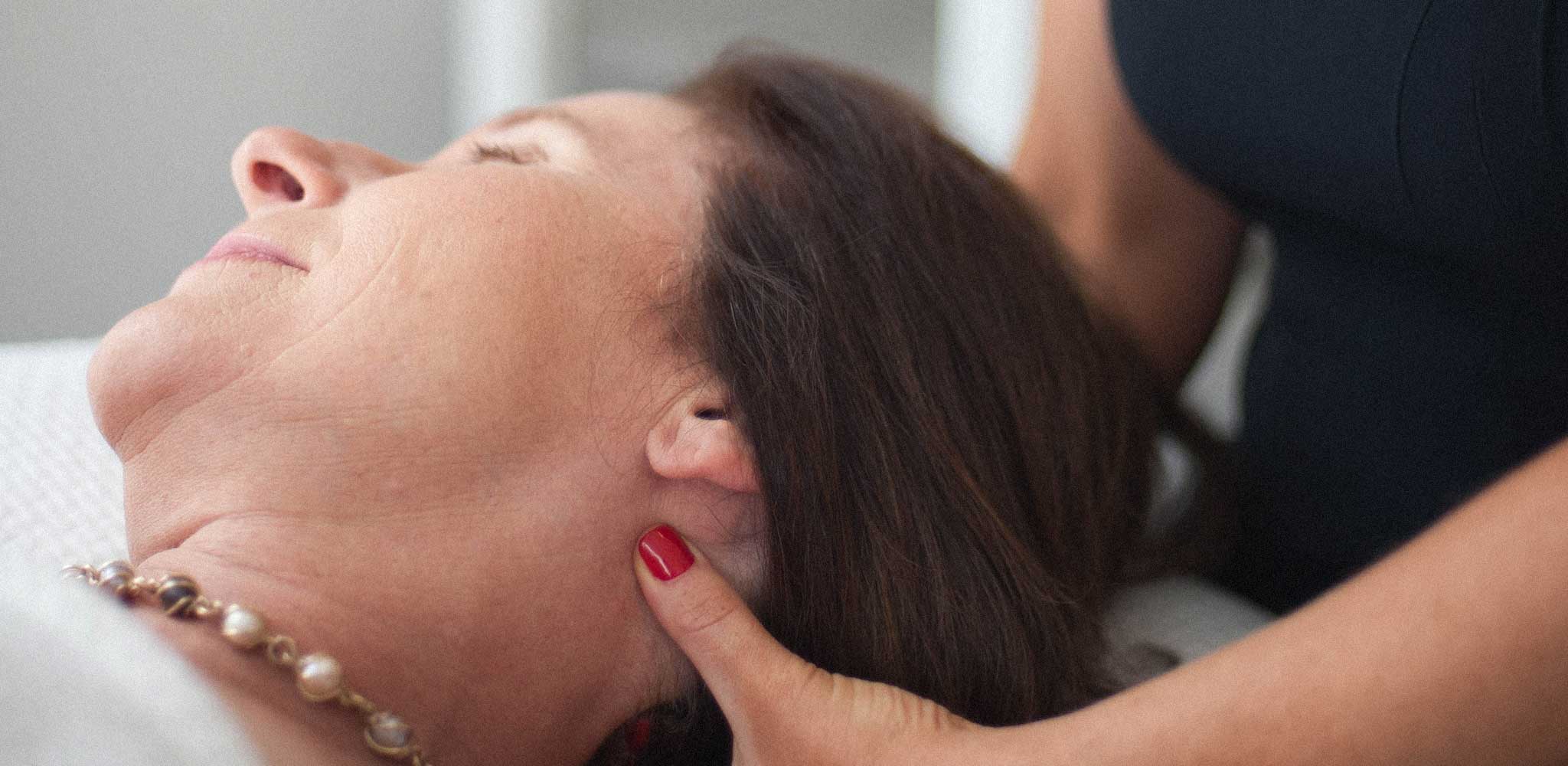
Neck pain is pain felt in the neck, which will include the sides of the neck and back of the neck. Basically the entire upper spine area, above the shoulder height and just below the head.
When certain nerves are affected, neck pain can extend beyond the back of the neck to areas such as
- upper back
- shoulder
- arm
In fact, neck pain is so common that it is estimated that neck pain affects approximately 30% of the US population each year. Neck pain can be caused by sudden trauma such as a
- falls
- sports injury
- motor vehicle and car accident
- or by long-term problems in the spine
Neck pain most frequently affects adults aged 25 to 50 years.
Some studies indicate that women are more likely to suffer neck pain than men.
Risk factors for getting neck pain includes:
- poor posture
- obesity
- smoking
- repetitive lifting
- office and computer work
- and involvement in athletic activity
People with neck pain can have difficulty performing activities such as
- working
- driving
- sleeping
- playing sports
- or simply turning their heads
Thankfully, majority of neck pain episodes do not require surgery and respond best to physical therapy.
Our senior physiotherapists design individualized treatment programs to help people with neck pain
- reduce or eliminate pain
- regain normal movement
- and get back to their regular activities.
Contents
HOW DOES NECK PAIN FEEL LIKE?
People with neck pain may experience stiffness in the neck, and may describe the pain they feel as:
- Sharp neck pain
- Stabbing neck pain
- Dull neck pain
- Aching neck pain
- Throbbing neck pain
- Tingling neck pain
In some cases, neck pain caused by irritated nerves may extend into the upper back, shoulder blades, shoulders, arms, or hands. This condition is called “radiculopathy”
(Read related article: lumbar radiculopathy).
Our senior physiotherapists can help determine if this condition is happening to you and your neck, and will work closely with your physician and surgeon to determine the correct treatment.
SIGNS AND SYMPTOMS
The type and location of your symptoms depend on the tissue or structure that is affected, and the severity of the injury.
Neck pain can cause any of the following signs:
- Inability to bend or rotate the neck
- Difficulty looking up
- Difficulty looking over the shoulder
- Weak arm and shoulder muscles
- Muscle spasms
Neck pain can cause any of the following symptoms:
- Pain in the neck, upper back, shoulders, arms, or hands
- Numbness or tingling in the neck, shoulders, arms, or hands
- Weakness in the arms
- Increased pain when coughing, sneezing, reaching, or sitting
- Inability to stand straight or sit up straight
- Stiffness when trying to move, or a feeling of being “stuck” in a position such as stooped forward, or with the head leaning to the side
- Tight muscles
- Headaches
- Inability to remain in one position for a long period of time, such as sitting or standing, due to pain
- Pain that is worse in the morning or at night
- Difficulty sleeping due to pain
HOW IS NECK PAIN DIAGNOSED?
Our senior physiotherapists will conduct a thorough examination that includes taking your health history. He or she will also ask you detailed questions about your pain or injury, such as:
- How and when did your neck pain start?
- What type of discomfort do you feel, and where do you feel it?
- At what time of day is it worse?
- What can’t you do right now in your daily life due to the pain?
We will perform tests on your body to find physical problems, such as:
- Difficulty moving
- Weakness or tightness in the muscles
- Loss of skin sensation (numbness) in some areas
- Loss of reflexes
- Joint stiffness
- Poor posture
- Difficulty walking
If we finds any of the above problems, spinal physiotherapy treatment may begin right away to help get you on the road to recovery and back to your normal activities.
If more severe problems are found with any of the testing, we may collaborate with a physician or surgeon to obtain special diagnostic testing, such as an MRI.
Do be assured that we will work closely with physicians and other health care providers to make sure that you receive an accurate diagnosis and the treatment and care you need.
HOW OUR SENIOR PHYSIOTHERAPISTS CAN HELP YOUR NECK PAIN

Recent research has shown that spinal physiotherapy is a better treatment than surgery or pain medication (such as opioid medication) for relieving many cases of neck pain.
Physical therapy treatments often can help people avoid the need for surgery or medication altogether.
We will work with you to design a specific treatment program that will speed your recovery, including exercises and treatments that you can do at home. Physical therapy can and will help you return to your normal lifestyle and activities.
Patients often ask us how many sessions of neck physiotherapy they will need before their neck pain resolves, and the thing is the time it takes to heal each condition varies, but an individualized physical therapy program can be effective and efficient, and help heal neck pain in a matter of weeks.
We may advise you to:
- Rest the painful area by avoiding activity that causes worsening symptoms in the neck or arms.
- Stay active around the house, avoid prolonged bed rest, and go on short walks several times per day. Movement will decrease pain and stiffness, and help you feel better.
- Perform the simple neck movements he or she will teach you. These can help reduce stiffness and pain and restore normal motion of the neck.
- Apply heat therapy or cold therapy to the affected area for 15 to 20 minutes every 2 hours.
- Sit in firm chairs. Soft couches and easy chairs may make your problems worse.
- Consult with a physician for further services, such as medication or medical tests.
We will work with you to:
Reduce pain and other symptoms
We will help you understand how to avoid or modify the activities that caused the injury, so healing can begin. He or she may use different types of treatments and technologies to control and reduce your pain and symptoms.
These may include gentle hands-on techniques, known as manual therapy, that he or she will perform for you; specific neck movements that you will be taught to perform yourself; and the use of technologies, such as
- ultrasound therapy
- radio-frequency Indiba physiotherapy
- deep tissue release
- dry needling
- computerized spinal decompression traction
We will examine each person individually to determine exactly what type of approach will help reduce pain.
Avoid surgery
In most cases, we can design an individualized treatment program to help relieve neck pain—even severe radiculopathy (pain that travels from the neck down into the arm or hand)—to help individuals with neck pain avoid surgery. In rare cases, radiculopathy requires surgery to relieve its cause.
Improve posture
If we find that poor posture has contributed to your neck pain, we will teach you how to improve your posture so healing can occur.
Improve motion
We will choose specific activities and treatments to help restore normal movement in any stiff joints. These might include “passive” motions that we will do for you to move your spine, or active exercises and stretches that you do yourself.
You can do these motions at home, in your workplace, and before your sports activities to help hasten healing and pain relief.
Improve flexibility
We will determine if any of the involved muscles are tight, and teach you gentle stretching exercises that you can perform at home. He or she also may supervise your performance of special stretches during your physical therapy treatments.

Improve strength
If we finds any weak or injured muscles, he or she will choose and teach you the correct exercises to gently restore your strength and agility.
For neck pain, “core strengthening or stabilization” is commonly used to restore the strength and coordination of muscles around your spine.
Improve endurance
Restoring muscular endurance is important for people with neck pain. We will develop a program of activities to help you regain the endurance you had before the neck pain started.
Return to Activities
We will discuss your activity levels with you and use them to set your work, sport, and home-life recovery goals. Your treatment program will help you reach your goals in the safest, fastest, and most effective way possible.
For spine problems like neck pain, we may teach you correct ways to lift objects (called “body mechanics”) that will help protect your spine from further injury or reinjuries.
As your neck pain improves, it will be important for you to continue your new posture and movement habits to keep your neck healthy and pain free.
Following Surgery
In rare cases of neck pain, corrective spinal neck surgery is necessary to relieve pressure on a nerve or on the spinal cord. If you undergo surgery, be assured that our senior physiotherapist will work closely with you and your surgeon to help you regain motion and strength more quickly than you could on your own, and help you return to your daily activities as quickly as possible.
Where To Next?
- Go to Home / Start
- Learn and find out more about your pains (bones, muscles, joints, tendons, ligaments, nerves etc) at Pain Conditions & Injuries
- Visit our shop to see products we recommend for pain relief, heating, treatments and more
- Contact us